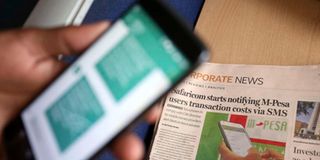Digital inclusion and connectivity no longer a luxury; they are a necessity

Before M-Pesa 15 years ago, banking in Kenya was primarily a brick-and-mortar affair.
What you need to know:
- Although the industry has made significant progress with 4G coverage, one-third of our population don’t have mobile internet.
- New opportunities have emerged with mobile connectivity at the heart of economic and societal recovery.
Last week, I joined global players at the annual Mobile World Congress (MWC) in Barcelona. I spoke and engaged with policymakers, regulators, technology and telco industry stakeholders across the globe in various sessions.
At the Ministerial Programme, I spoke on a topic that I am passionate about; the importance of digital inclusion and connectivity in a global digital economy.
My session’s key message was that connectivity plays a crucial role in driving Africa’s transformation. Although the industry has made significant progress with 4G coverage, one-third of our population don’t have mobile internet.
Why? They cannot afford the devices.
I discussed how we could expand partnerships with other like-minded organisations to bridge the digital divide by ensuring access to affordable devices. Together with Google, we premiered a global first, our Lipa Mdogo Mdogo initiative, making it possible for customers to purchase a smartphone via manageable daily instalments of Sh20.
I also participated in a multi-lateral discussion on how Kenya can expand its opportunities to build a sustainable and purpose-driven digital trade framework.
This is both a business and a personal ambition.
Value-added services
We cannot leave anyone behind in the ever-digital environment. The pandemic has impacted people and businesses in all corners of the globe. Still, new opportunities have emerged with mobile connectivity at the heart of economic and societal recovery and inclusive and sustainable development.
For instance, before M-Pesa 15 years ago, banking in Kenya was primarily a brick-and-mortar affair.
M-Pesa has rewritten this script. Today, banks report that more than 90 per cent of their transactions are on mobile and online.
Through strategic partnerships with banks, telcos can spur innovation, drawing from synergies to deliver value-added services. We can build on the M-Pesa success to build new solutions for individuals and enterprises, such as our M-pesa Super App, which won the ‘Best Mobile Innovation for Connected Living’ at the MWC.
Telcos have a role in spurring inclusive, sustainable development by driving financial inclusion. Safaricom pays attention not because we have more than 41 million customers who depend on our digital services, but because it is the right thing to do. It is a crucial contribution towards enabling a dignified and productive life for our customers, colleagues and communities. Digital inclusion and connectivity are no longer a luxury; they are a necessity.
The Covid-19 pandemic has demonstrated the importance of connectivity for everything from work, education, financial services to telemedicine. It also showed the urgency in addressing the global digital divide, which has seen many still left out of opportunities for economic development.
The factors that widen the digital divide include affordability, safety and digital proficiency.
The desire to change this script fits our purpose, which is to Transform Lives ,and our Vision to be a purpose-led technology company by 2025 and enables a digital lifestyle to our customers.
We purpose to offer digital solutions to society’s most pressing challenges.
Drive digital inclusion
I am committed to offering leadership to drive digital inclusion, enabling access to affordable devices and empowering micro and small businesses to use technology to grow their businesses. This will allow the small businesses to be more competitive, resilient, inclusive and sustainable.
Beyond my speaking engagements while at MWC, I enjoyed the digital, experiential activities such as the tour of Android Avenue, where I saw how one of our partners, Google, is working on intelligent solutions for the home, powered by Artificial Intelligence.
I also had a fascinating time touring the Huawei space, where I learned about their latest products, saw them demo their technology solutions and offer a glimpse into the future of innovation.
I dream of bringing some of these innovations –alongside technologies like metaverse, a buzzword at the forum, edge computing and 5G – to our customers and communities. Of course, there are several different takes on how we shall pivot to this new universe, but for me, what stood out is that engineering a memorable customer experience in this new world will define success.
Safaricom, however, will not be able to do this alone. More needs to be done collaboratively with governments, regulators and industry players to find breakthrough solutions, including local production, lower taxes, financing and subsidies to get millions to acquire smartphones in Kenya and across Africa.
Nick Read, CEO, Vodafone Group, in his keynote speech at MWC in Barcelona, said: “If we are to be successful in the digital transformation – we all need to go faster, challenge the status quo – and ‘lean in’ on co-creation. Though our sector is highly competitive – importantly, to remain globally competitive – we also need to collaborate.”
The moment to act is now.
The writer is the Chief Executive Officer, Safaricom





